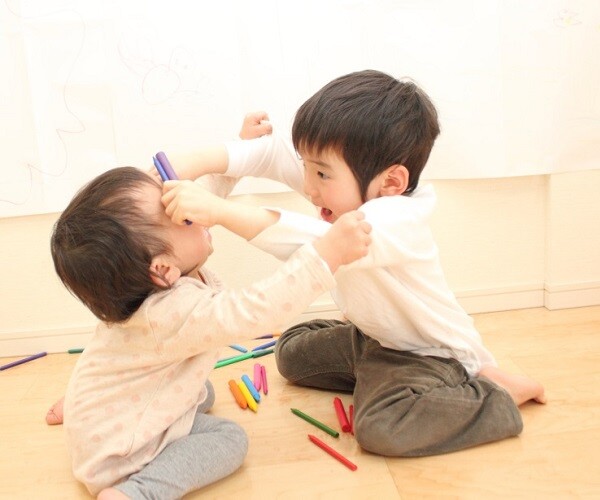When conflicts arise, children often experience a range of emotions such as anger, sadness, or disappointment. Forcing children to forgive immediately diminishes their feelings and makes them feel unheard and disrespected.

Illustration.
Forcing children to forgive can prevent them from learning how to effectively resolve conflicts. This is a process that takes time and reflection for children to work through.
One of the most effective ways to teach children the value of forgiveness is to create a safe and supportive environment. When children feel safe to express their emotions, forgiveness will come more naturally, and they will learn to balance their relationships.
Forgiveness is a process, and children need time and space to learn and develop this skill. With proper guidance and support, they will grow up to build healthy relationships. On this matter, psychologist Nguyen Ngoc Vui suggests some appropriate approaches for parents.

Psychologist Nguyen Ngoc Vui.
Scenario: Child says, “Today I had an argument with my friend because they broke my new toy”; “A classmate bad-mouthed me, so I threw my book at them!”…
Parent: “Next time, remember to tell your friend it’s okay and not to make things complicated. You need to learn to give in and get along with your friends.”

What does the expert think about the parent’s approach of forcing the child to forgive?
This scenario can be viewed from two perspectives. One, the parent is forcing the child to forgive. Two, the parent is encouraging a peaceful resolution. In reality, this perspective is not entirely wrong, but it can have consequences for the child.
If parents are too dictatorial or conservative in applying the second approach, insisting that the child give in and make peace in every situation, the child may feel a sense of injustice and believe that their parents do not understand them.
Therefore, in this scenario, parents need to reconsider their request for forgiveness, especially if the child has done nothing wrong.

How will forcing children to always forgive others affect their personality development, psychology, and relationships?
From a positive perspective, it first teaches children that all issues can be resolved peacefully when we learn to respect and care for others. However, this positive influence does not occur frequently and depends on the specific character of each child.
For children with strong personalities, they may not feel they are in the wrong (in fact, in this scenario, the child has not done anything wrong), but their parents still demand forgiveness.
Firstly, it will lead the child to believe that their parents do not understand, listen, or stand up for them, leading to the child’s reluctance to interact with their parents. Over time, this can result in low self-esteem.
On the other hand, forcing children to always forgive may give rise to aggressive behavior due to pent-up resentment. This is especially true during early adolescence when children’s perceptions change rapidly.
Considering the child’s relationships, there are also two sides. Firstly, the child may use concession to develop relationships, reminding themselves to obey their parents and be amicable. Alternatively, if the child feels forced to forgive, they may find their relationships troublesome and choose to isolate themselves.

How can parents encourage children to develop skills to resolve such situations without forcing them to forgive?
Parents should help children understand that forgiveness is primarily for their own benefit. Research has shown that holding on to anger can lead to physical health issues.
Teach children constructive ways to deal with conflict. Typically, there are five approaches to handling stressful, conflict-inducing situations.
– Avoidance (represented by a turtle): The child ignores the problem and acts as if nothing happened.
– Concession (represented by a teddy bear): The child always gives in.
– Dominance (represented by a shark): The child always seeks to win.
– Cooperation (represented by an owl): The child turns conflict into cooperation.
– Compromise (represented by a fox): The child learns to mediate, encouraging both sides to give and take and find a mutually beneficial solution.
Parents should identify which of these five approaches their child tends to use in conflicts and help them find a balance, avoiding excessive concession or aggression. Additionally, guide your child to distinguish between right and wrong and make appropriate choices.

When a child feels wronged or hurt, how can parents support them in finding a solution instead of simply saying “forgive your friend”?
As mentioned earlier, parents can consider the five basic approaches.
If, after careful consideration, the child decides to end the friendship, parents should respect their choice.
Alternatively, if the child agrees to make peace, a positive step is to encourage them to maintain the friendship and commit to preventing similar situations in the future. Parents can facilitate this by creating a safe space for reconciliation, such as inviting the friend over to play after school.
In reality, many issues stem from misunderstandings. Therefore, parents should guide their children on positive interaction, respectful communication, and embracing differences to improve overall communication.
Next, guide the child and their friend to come up with a solution together. Finally, both parties should implement the agreed-upon solution.
With parental support and guidance, children will understand that their parents care about them and are on their side. They will also realize that building good relationships is beneficial and helps them learn to resolve conflicts without fighting or arguing. This lays a solid foundation for handling future relationships.
































